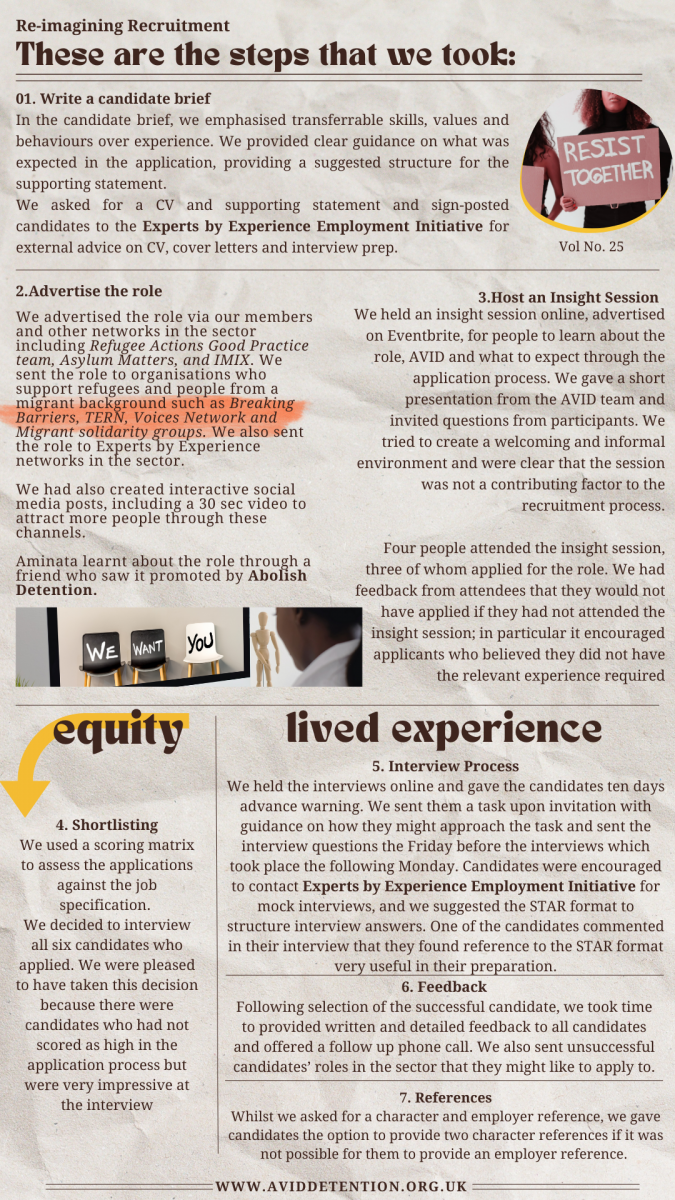Re-imagining Recruitment: our approach to increasing lived-experience in the AVID team
This summer, we recruited a new member to the AVID team, Aminata Kalokoh, as Member Development Coordinator. Aminata’s role at AVID is to support newly formed and developing visitor groups in the AVID network. Aminata is passionate about raising awareness of the realities of detention in the UK. Alongside her role at AVID, she is a member of the Community Advisory Board with the University of Oxford Centre for Criminology and is working on an animation to give voice to people’s experiences in detention.
“I am a very easy-going person with a compassionate approach to life. I am looking forward to creating a positive impact in the lives of many by working with our vibrant team of volunteer visitors, to make it a free world for all.” Aminata
When we began the recruitment process earlier this year, we decided to ring-fence the role for someone who has been impacted by immigration detention or hostile environment policies. This decision was motivated by participation in a project last year with Refugee Action on Co-production with Experts by Experience as well as increasing recognition that, to realise our mission, we must do better at creating inclusive communities in our own organisation. Gee Manoharan, who has worked at AVID for six years, undertook research over the period of a few months with Refugee Action and, amongst several recommendations, suggested that AVID aspire to have representation of at least fifty percent of staff members who have experience of detention. For Gee, who has experience of immigration detention himself, the need to meaningfully engage with people who have been impacted by detention has long been a pressing concern:
“Our research showed the clear gap in recruitment drive, motivation, and the barriers that many people faced. Our network understood and believed in inclusivity and involvement of people with lived experience. However, evidence suggested the approach remained ad hoc, tokenistic and poorly understood about real meaningful involvement. This suggested to us that we need to rethink the recruitment approach and reposition involvement beyond one-off lectures and storytelling approach” Gee
Previously, when recruiting for other roles, we actively encouraged applicants with lived experience through explicit reference in the job description and targeted insight sessions. However, this had failed to result in an increase in lived-experience staff members. Therefore, we decided to ring-fence the role and run a targeted recruitment drive.
These are the interview questions that we asked:
- Why have you applied for this particular role and what skills would you bring to it?
- What challenges do you think voluntary groups might face when visiting people in immigration detention? How would you support groups to overcome these challenges?
- This role will require you to work closely with AVID members, volunteers of Durham Visitors Group, centre management and other charity partners. Can you share an example of when you have had to build relationships with different stakeholders, and what you did to make these relationships effective?
- How do you prioritise your workload when you have to juggle multiple priorities and tasks at one time? Give examples if possible.
- Can you share an example of a time when you have supported someone else to take on a leadership role? What did you do, and what impact did it have?
- What would you do to make a workshop inclusive to people from different backgrounds, including those with experience of detention? Please give examples where possible.
- Can you tell us about a time you have had to support other people who were in conflict with each other. How did you approach the situation?
Learning and Reflections
What we would do next time:
- We would consider other ways, such as a longer video, to communicate the role and accompany the candidate brief.
- One applicant had internet connection difficulties during the interview and, on reflection, we felt we should have given the option for in person interview from the outset or to provide a data allowance. Next time, we would also check with applicants that they have somewhere quiet and comfortable from where they can interview so that we can support to find somewhere suitable if this is not the case.
- We had positive feedback from the candidates involved and the task was an excellent way for candidates to demonstrate their skills and creativity in a way that would have been difficult had we just asked questions.
- We would create a survey for candidates to complete after the process to provide anonymous feedback on the process and suggestions for next time.
Overall, the process was successful not only in supporting us to find an excellent new team member, but it also encouraged very useful reflection on our recruitment processes. On starting the process, the question we kept asking ourselves was: “How can we give the applicants the best possible chance to demonstrate their skills and suitability for the role?”
This led to a number of steps that we would like to include in all of our recruitment processes, whether the role is ring-fenced or not, because we feel it led to a more effective and productive recruitment process for everyone involved.
Recommendations and reflections from Aminata:
When the job application was forwarded to me by a friend, I glanced at it and thought – “this seems complicated, but I will come back to it.”
On a second look, I realised that I had both lived experience and other transferable skills as defined on the job advert. However, I had been away from the job market for a while due to immigration issues and, as a new mum my confidence had been knocked. I was hesitant about starting the application.
I decided to wait and attend the online insight session to understand more about the process of applying. Unfortunately for me, I remembered 2 hours after the event was over! My instinct said to me, “you have been thinking about this job for a while and maybe the reason for missing out the online session was a blessing in disguise.” Nevertheless, at this point, I picked up my tablet and started filling out the application form.
When I received the invite for the interview, I was shocked to see that a case scenario had been given out in advance and was also told that interview questions will be released later before the interview. This for me was a new phenomenon in the world of interviews as I was used to having case scenarios and questions given out on the day of the interview. I commend AVID for doing this, because this creates an equal chance for everyone invited to this interview.
As much as these questions where very similar to ones that I had in the past, it was an opportunity to work on my interview and presentation skills. I built my confidence around the fact that I have had lived experience of detention and wanted to help in the fight against social injustices faced by minority groups.
Overall, the interview process was smooth, and the interviewers made the process very relaxing. I believe they genuinely wanted to give the applicants the best possible chance of demonstrating their skills and suitability. They also showed a sign that they were aware of the sensitivity of what lived experience could present in answering some of their questions and I commend them for that.
I will recommend that in future interviews of this role, they make aware to the interviewee that a person of lived experience is present in the panel, as this could give the interviewee a sense of knowledge that someone understands where they are coming from with regards to certain points been raised.
EbE Employment Initiative* provided us with very useful feedback after completion of the process:
- One of the main reasons applicants chose to apply was the fact that the role was ring-fenced to people with lived experience.
- Applicants were drawn to the role and the organisation as they felt like their lived experience (whether in this country or from their home country) was valued. They believed this role should best be carried out by lived expertise.
- One applicant, as someone who is new to the UK, suggested that there could have been a better understanding shown from AVID about the situation of refugees and migrants outside of the UK. They suggested the interview panel include an expert by experience who has similar experience to those applicants (who have spent less time in the UK) this would have helped understand the situation of the applicant better.
- It was suggested that the interview questions should be made simpler.
- It was suggested that the job advert could have been clearer on the context for visiting experience and AVID’s role in supporting visiting experience.
- AVID could have offered reimbursement of expenses, especially for data for the interview, or provision of IT and data for interviews.
*: EbE Employment Initiative: find out more about the support here
Where to from here
Achieving inclusive recruitment will not end immigration detention, but it might be the beginning of the end. As a community, we cannot afford to miss out on the extraordinary talent, skills and experience that exists within currently underrepresented people with lived experience. We will limit the impact we do if we do not become more inclusive.
The responsibility for creating an inclusive culture belongs to all of us. We need to do better.





